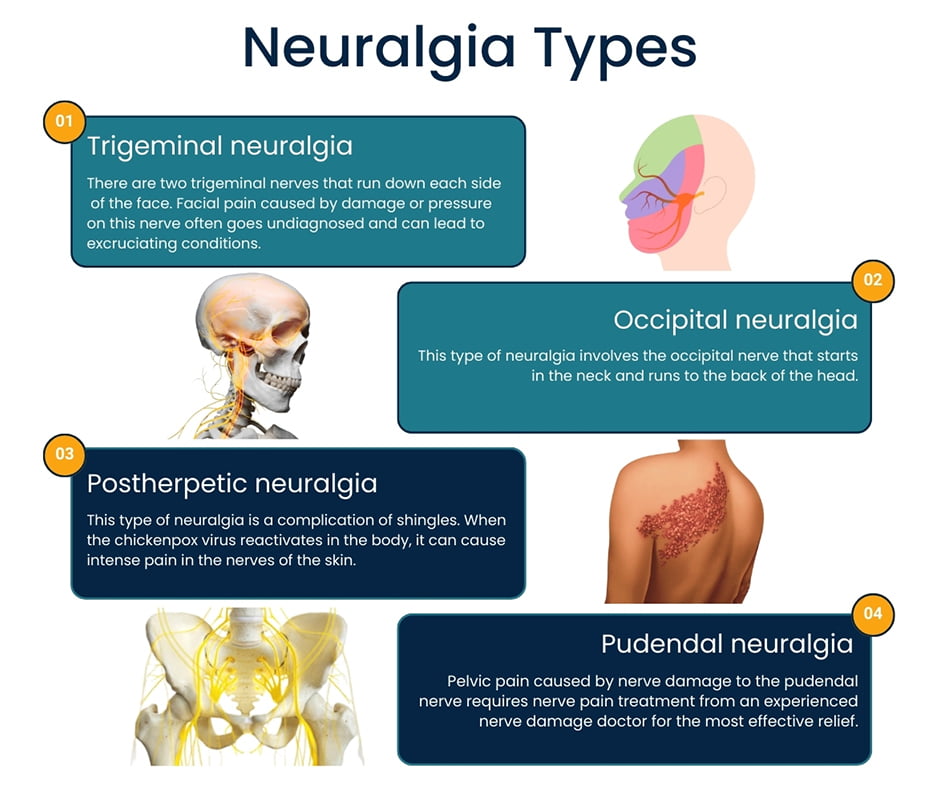Nerve pain and neuralgia can occur in so many different places in your body and for so many different reasons that it’s best to consult a specially trained nerve damage doctor to get the most accurate diagnosis and most effective nerve damage treatment. In NYC, your best choice is at Pain Management NYC. Get up-to-date treatment for damaged nerves, learn how to treat nerve damage and prevent it from causing you such discomfort. Call today for an appointment.
What Is Neuralgia?
Neuralgia refers to intense pain along a nerve. Throughout your body, nerves carry impulses between your body and your brain, allowing sensation, movement and both voluntary and involuntary functions of your body. When a nerve is irritated or damaged, it can cause sharp, shocking pain.
Another name for that nerve pain is neuralgia. Neuropathy is the medical term for nerve damage. Neuralgia or nerve pain is a symptom of neuropathy and other conditions. Hip pain, hand pain, back pain and other types of pain often are triggered by inflamed or damaged nerves.
When you have debilitating nerve pain, you can’t think about much other than how to treat nerve damage or pain. For top-rated nerve damage doctors and pain relief specialists in NYC, look no further than Pain Management NYC, where you can receive effective spinal cord stimulation, peripheral nerve stimulation and other treatments.
Are There Different Types of Neuralgia?
Neuralgia can affect nerve fibers in any part of the body. There are different categories of neuralgia based on what area of the body is affected.
Some types of neuralgia include:
- Trigeminal neuralgia. There are two trigeminal nerves that run down each side of the face. Facial pain caused by damage or pressure on this nerve often goes undiagnosed and can lead to excruciating conditions.
- Occipital neuralgia. This type of neuralgia involves the occipital nerve that starts in the neck and runs to the back of the head.
- Postherpetic neuralgia. This type of neuralgia is a complication of shingles. When the chickenpox virus reactivates in the body, it can cause intense pain in the nerves of the skin.
- Pudendal neuralgia. Pelvic pain caused by nerve damage to the pudendal nerve requires nerve pain treatment from an experienced nerve damage doctor for the most effective relief.
Peripheral neuralgia is a type of neuralgia that affects the peripheral nervous system, which includes nerves in all areas of the body outside the brain and spinal cord.
Peripheral neuralgia is usually experienced as pain in the arms, hands, legs or feet.
- Diabetic neuropathy
- Peripheral neuropathy
- Ulnar neuropathy
- Polyneuropathy
- Small fiber neuropathy
- Neuropathy in feet
- Neuropathy in hands
- Complex regional pain syndrome (CRPS)

What Are the Methods of Nerve Damage Treatment?
Nerve pain treatment depends on the cause and location of the pain along with the level of severity you’re experiencing. The goal of treatment for nerve damage is to treat any underlying disease and to relieve pain and improve function.
Treatment for damaged nerves usually starts with medication such as:
- Prescription medications, such as anticonvulsants, antidepressants and pain relievers
If these methods are ineffective, other options your pain doctor may recommend include:
- A nerve block that provides relief for up to several months at a time
- Physical therapy to improve strength and relieve stiffness
- Peripheral nerve stimulation and spinal cord stimulation are two of the best ways to treat chronic pain from nerve damage.
Complementary forms of treatment may be combined with medication to help reduce pain. Examples of complementary treatments include meditation, yoga, aromatherapy, biofeedback and acupuncture. If nerve damage has been caused by diabetes, working toward better control of blood sugar should improve symptoms.
Surgery to relieve pressure on the nerve may also be considered as a method of treatment for nerve damage. Surgical procedures that may be done when there’s extensive nerve damage include microvascular decompression and balloon compression.
What Are Some Causes of Nerve Damage or Pain?
There are many different causes of nerve pain and nerve damage including medical conditions and physical trauma. One of the most common causes of nerve pain is diabetes, which damages nerves as the disease progresses.
Examples of other causes include:
- Compression of nerves from a bone or ligament
- Trauma from an accident or surgery
- Autoimmune diseases such as multiple sclerosis, lupus and Guillain Barre syndrome
- Chronic kidney disease
- Infections such as shingles, Lyme disease or HIV/AIDS
- Deficiency of vitamins like B12
- Tumors or cysts
Alcoholism, exposure to toxic substances and some medications such as those prescribed to treat cancer can cause neuralgia. Carpal tunnel syndrome and a herniated disk are examples of nerve pain caused by pressure on a nerve. It’s not always possible to identify the cause of nerve damage or pain.
What Are the Signs of Neuralgia and Nerve Damage?
The symptoms you experience from nerve inflammation or damage vary depending on which nerve or nerves are affected. Symptoms of neuralgia can range from mild to severe. Back pain may be a sign of a pinched nerve in the spine while pressure on the sciatic nerve can cause pain that radiates down one leg, known as sciatica.
Other symptoms you may experience from nerve damage or inflammation include:
- Tingling and numbness
- Sensitivity to touch near the affected nerve
- Sharp stabbing or burning pain that may come and go and intensify with movement
- Weakness, loss of muscle strength or paralysis
When you feel pain from stimuli that don’t usually cause pain such as a light touch or a cold breeze, it may be a sign of nerve damage or inflammation. In some cases, nerve pain can cause a decreased sensitivity to touch rather than an intensified reaction to touch. Nerve pain can be overpowering and cause difficulty sleeping and emotional stress.
To diagnose nerve pain and its underlying cause, your NYC nerve damage doctor does an exam to pinpoint the location of the pain. A neurological exam may show problems with reflexes or loss of muscle mass. A variety of tests may be done such as blood tests, X-rays, an MRI or a nerve conduction velocity test.
When Should I See a Doctor for Nerve Damage?
If you develop symptoms of nerve damage such as unexplained pain, weakness or tingling, they should be evaluated by a nerve damage doctor who has extensive training and experience with issues of the nervous system. Don’t try to ignore signs of nerve problems, because if neuralgia isn’t treated, it can worsen and severely interfere with your daily routine and stop you from doing things you love.
Pinpointing the best treatment for nerve pain leads to the most effective treatment for damaged nerves in your specific situation. For the most up-to-date nerve pain treatment, contact Pain Management NYC where you’ll find the most trusted and respected pain specialists in NYC.

Boleslav Kosharskyy, MD, is a top-rated, best-in-class interventional pain management doctor. He is board-certified in Anesthesiology, Interventional Pain Medicine, and Palliative Care.
Dr. Kosharskyy is an Associate Professor of Anesthesiology and Rehabilitation Medicine at Albert Einstein Medical College. He’s also the Associate Medical Director of Pain Medicine and Director of Anesthesia for the Joint Replacement Center at Montefiore Medical Center and Albert Einstein Medical College.
He is an active member of the American Society of Anesthesiology (ASA), the American Society of Regional Anesthesia and Pain Medicine (ASRA), and the New York State Society of Anesthesiologists (NYSSA)
